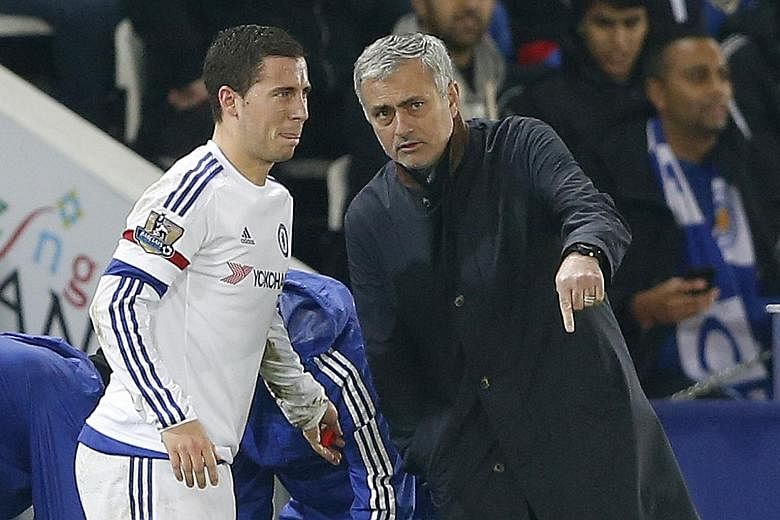Inside the entrance to Chelsea's training ground there is a framed photograph, going back to the evening of May 19, 2012, of the G8 summit at Camp David as the world's leaders interrupted their talks on Syria, at the request of Angela Merkel, to gather around a television in the Laurel Lodge because she had just been told the Champions League final had gone to a penalty shootout.
Merkel is on her feet, gripping the brown leather seat in front of her. Didier Drogba has just rolled the decisive penalty into Bayern Munich's net and, in that precise moment, rumour has it that Germany's Chancellor was heard to say "scheisse" under her breath.
If ever a Champions League was won by a team's sense of togetherness, that was the one. Chelsea were famed for it.
And when Jose Mourinho was honoured at a dinner at the Savoy a couple of years ago, Frank Lampard, the guest speaker, mentioned that night. "That all started from him," Lampard said. "He might not have been there, but that spirit came down from him."
Mourinho's players would do anything for him and he, in turn, did everything for them. That bond seemed impenetrable. The contrast with Monday's defeat by Leicester could hardly be starker at a time when Chelsea are a point above the relegation zone and it is increasingly difficult to think that the Portuguese can possibly survive much longer.
Mourinho, once such a fierce protector of his own, spoke about his team in a way he never has done before.
His wild assertion that he had been "betrayed" and his choice of language must have left Roman Abramovich wondering whether the respect between manager and players was still there. Their latest ordeal ended in such a way it would have been no surprise to find a short, clipped statement published on Chelsea's website first thing in the morning.
Perhaps he half-expected it, too, given that much of what he said - the gist of it being: blame them, not me - felt like he was getting his retaliation in first.
His line about being "betrayed" certainly felt strategic given that he is as media savvy as they come and repeated it in virtually every interview.
Another manager might have been "let down" or "frustrated" but Mourinho knows his ability to shape the headlines. It was, however, entirely the wrong word.
Losing a player inside the penalty area is never a betrayal of the manager, especially when the opponent operates at the speed of Jamie Vardy. Bad defending? Yes. Letting down the team? Possibly, if you want to be harsh.
But a betrayal? The dictionary definition of the word is to "expose (one's country, a group, or a person) to danger by treacherously giving information to an enemy".
The most relevant question now is how the players react to that kind of allegation because there is plainly a risk here that Mourinho loses what is essential for anyone in his position, which is the trust of the dressing room.
How must John Terry feel, for instance, after everything he has given for Chelsea to be accused of betraying the manager? Does Kurt Zouma, at an age where there will inevitably be momentary lapses of concentration, deserve accusations of treachery because he lost Vardy for a split-second before the first goal? And what do the players think of Mourinho absolving himself from even the smallest portion of blame?
It is rare these days to hear a manager, any manager, turning on his own players in front of the cameras. Yet it was not all about that one word.
"They have to look to Sunderland and Watford (Chelsea's next two opponents) and say, 'We are at the same level, I am not the superstar, I am not the player of the season, I am not the world champion, I am not the Premier League champion'," Mourinho said.
See what he did there? It was subtle, but the only players who could be identified personally from that critique are Eden Hazard, Chelsea's player of the year, and Cesc Fabregas, a World Cup winner with Spain.
Around the pointed little barbs, he did actually make some relevant points.
Costa had so little confidence, he said, he was no longer trying to get into the penalty area, which was leaving them short of presence in attack. He was right but the thought did occur that speaking about it that way - unsympathetic, resigned, without a single word to suggest he backed his player to put it right - might not be the best way to repair the damage.
The point is this should be a time when Mourinho is trying to convince the people above him that the old togetherness is still there. It should be a united front, whatever issues there may be behind the scenes. Instead he has made it clearer than ever that those days have gone and that, if the guillotine does fall, he wants everyone to know he is actually the victim here. The irony is that there are players in Chelsea's dressing room who are genuinely entitled to feel betrayed.
THE GUARDIAN

